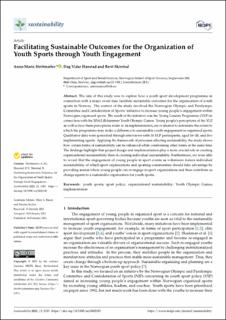| dc.contributor.author | Strittmatter, Anna-Maria | |
| dc.contributor.author | Hanstad, Dag Vidar | |
| dc.contributor.author | Skirstad, Berit | |
| dc.date.accessioned | 2021-03-20T09:21:06Z | |
| dc.date.available | 2021-03-20T09:21:06Z | |
| dc.date.created | 2021-02-18T08:39:21Z | |
| dc.date.issued | 2021 | |
| dc.identifier.citation | Sustainability. 2021, 13(4), Artikkel 2101. | en_US |
| dc.identifier.issn | 2071-1050 | |
| dc.identifier.uri | https://hdl.handle.net/11250/2734595 | |
| dc.description | This article is an open access article distributed under the terms and conditions of the Creative Commons Attribution (CC BY) license (https://creativecommons.org/licenses/by/4.0/). | en_US |
| dc.description.abstract | The aim of this study was to explore how a youth sport development programme in connection with a major event may facilitate sustainable outcomes for the organization of youth sports in Norway. The context of the study involved the Norwegian Olympic and Paralympic Committee and Confederation of Sports’ initiative to increase young people’s engagement within Norwegian organized sports. The result of the initiative was the Young Leaders Programme (YLP) in connection with the 2016 Lillehammer Youth Olympic Games. Young people’s perceptions of the YLP, as well as how these perceptions relate to its implementation, are evaluated to determine the extent to which the programme may make a difference to sustainable youth engagement in organized sports. Qualitative data were generated through interviews with 16 YLP participants, aged 16–20, and five implementing agents. Applying the framework of processes affecting sustainability, the study shows how certain forms of sustainability can be enhanced while constraining other forms at the same time. The findings highlight that project design and implementation play a more crucial role in creating organizational sustainability than in creating individual sustainability. Furthermore, we were able to reveal that the engagement of young people in sport events as volunteers fosters individual sustainability, of which sport organizations and sporting communities should take advantage by providing arenas where young people can re-engage in sport organizations and thus contribute as change agents to a sustainable organization for youth sports. | en_US |
| dc.language.iso | eng | en_US |
| dc.subject | youth sports | en_US |
| dc.subject | sport policy | en_US |
| dc.subject | organizational sustainability | en_US |
| dc.subject | Youth Olympic Games | en_US |
| dc.subject | implementation | en_US |
| dc.title | Facilitating sustainable outcomes for the organization of youth sports through youth engagement | en_US |
| dc.type | Peer reviewed | en_US |
| dc.type | Journal article | en_US |
| dc.description.version | publishedVersion | en_US |
| dc.rights.holder | © 2021 by the authors | en_US |
| dc.source.pagenumber | 14 | en_US |
| dc.source.volume | 13 | en_US |
| dc.source.journal | Sustainability | en_US |
| dc.source.issue | 4 | en_US |
| dc.identifier.doi | 10.3390/su13042101 | |
| dc.identifier.cristin | 1891138 | |
| dc.description.localcode | Institutt for idrett og samfunnsvitenskap / Department of Sport and Social Sciences | en_US |
| dc.source.articlenumber | 2101 | en_US |
| cristin.ispublished | true | |
| cristin.fulltext | original | |
| cristin.qualitycode | 1 | |
